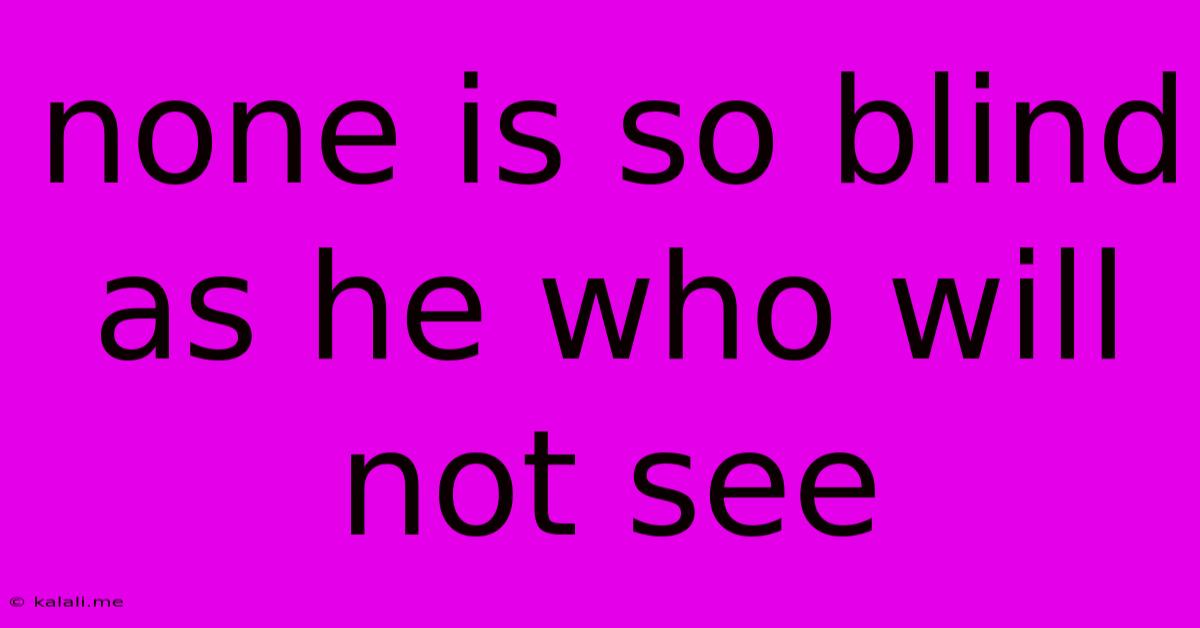None Is So Blind As He Who Will Not See
Kalali
May 22, 2025 · 3 min read

Table of Contents
None Is So Blind as He Who Will Not See: Confronting Deliberate Ignorance
The proverb "None is so blind as he who will not see" speaks volumes about the human capacity for self-deception and the dangers of willful ignorance. It's a potent reminder that true sight isn't just about physical vision, but also about the willingness to acknowledge and understand reality, even when it's uncomfortable or challenges our preconceived notions. This article explores the multifaceted nature of this proverb, examining its relevance in contemporary society and offering insights into overcoming deliberate blindness.
Understanding the Depth of the Proverb
At its core, the proverb highlights the difference between physical blindness and a far more insidious form – intellectual or emotional blindness. Someone who is physically blind lacks the capacity to see, but someone who will not see actively chooses to ignore evidence, facts, or perspectives that contradict their worldview. This willful ignorance can stem from various sources, including:
- Confirmation Bias: The tendency to seek out and interpret information that confirms pre-existing beliefs while ignoring contradictory evidence.
- Cognitive Dissonance: The mental discomfort experienced when holding two conflicting beliefs, leading to the rejection of information that causes this discomfort.
- Emotional Attachment: Strong emotional ties to certain beliefs can blind individuals to opposing viewpoints, even if those viewpoints are supported by strong evidence.
- Fear of Change: The discomfort associated with altering deeply held beliefs can lead to the rejection of new information, even if it's beneficial.
- Political and Ideological Polarization: The increasing polarization of political and ideological viewpoints often leads to individuals selectively absorbing information that aligns with their group identity, reinforcing biases and rejecting opposing perspectives.
The Consequences of Deliberate Blindness
The consequences of choosing not to see can be profound and far-reaching. These consequences extend beyond individual experiences and impact society as a whole. Examples include:
- Missed Opportunities: Failure to acknowledge new information or alternative perspectives can lead to missed opportunities for personal growth, professional advancement, and societal progress.
- Poor Decision-Making: Decisions made based on incomplete or biased information are often flawed and can have significant negative consequences.
- Increased Conflict: Refusal to see opposing viewpoints often fuels conflict and hinders constructive dialogue and compromise.
- Social Injustice: Willful blindness to systemic inequalities and injustices perpetuates discrimination and prevents meaningful social change.
- Erosion of Trust: The spread of misinformation and deliberate disinformation, coupled with the refusal to acknowledge facts, erodes public trust in institutions and experts.
Overcoming Deliberate Blindness: Cultivating Critical Thinking
Breaking free from willful blindness requires a conscious and sustained effort to cultivate critical thinking skills. This includes:
- Seeking Diverse Perspectives: Actively seeking out information from various sources and viewpoints, even those that challenge personal beliefs.
- Evaluating Sources Critically: Assessing the credibility and reliability of information sources before accepting them as truth.
- Identifying Biases: Recognizing personal biases and how they might influence interpretation of information.
- Embracing Intellectual Humility: Accepting that one may not always be right and being open to changing one's mind when presented with compelling evidence.
- Practicing Empathy: Attempting to understand the perspectives of others, even if they differ significantly from one's own.
Conclusion: The Importance of Openness and Inquiry
The proverb "None is so blind as he who will not see" serves as a powerful call to action. It urges us to cultivate intellectual curiosity, embrace critical thinking, and resist the temptation of willful ignorance. By actively seeking truth and striving for a more complete understanding of the world, we can overcome deliberate blindness and create a more informed, just, and equitable society. The journey towards true sight requires courage, humility, and a persistent commitment to seeking truth, even when it’s uncomfortable. Only then can we truly see.
Latest Posts
Latest Posts
-
Cube Root Of A Square Root
May 23, 2025
-
Yom Hashoah Is It Appropriate To Say
May 23, 2025
-
If The Truth Shall Kill Them
May 23, 2025
-
Transport Rheem Water Heater On Side
May 23, 2025
-
Blender Model Invisible Unless Armature Deleted
May 23, 2025
Related Post
Thank you for visiting our website which covers about None Is So Blind As He Who Will Not See . We hope the information provided has been useful to you. Feel free to contact us if you have any questions or need further assistance. See you next time and don't miss to bookmark.